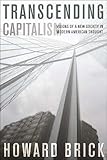Transcending Capitalism : Visions of a New Society in Modern American Thought / Howard Brick.
Material type: TextPublisher: Ithaca, NY : Cornell University Press, [2016]Copyright date: ©2015Description: 1 online resource (304 p.)Content type:
TextPublisher: Ithaca, NY : Cornell University Press, [2016]Copyright date: ©2015Description: 1 online resource (304 p.)Content type: - 9780801454295
- Capitalism -- United States -- History -- 20th century
- Economics -- United States -- History -- 20th century
- Social change -- United States -- History -- 20th century
- Sociology -- United States -- History -- 20th century
- General Economics
- Political Science & Political History
- U.S. History
- HISTORY / United States / 20th Century
- Social theory, postcapitalist society, modern Western society, postindustrial, American thought and culture, Cold War, reform ideology
- 306.3/4209730904 22
- online - DeGruyter
| Item type | Current library | Call number | URL | Status | Notes | Barcode | |
|---|---|---|---|---|---|---|---|
 eBook
eBook
|
Biblioteca "Angelicum" Pont. Univ. S.Tommaso d'Aquino Nuvola online | online - DeGruyter (Browse shelf(Opens below)) | Online access | Not for loan (Accesso limitato) | Accesso per gli utenti autorizzati / Access for authorized users | (dgr)9780801454295 |
Browsing Biblioteca "Angelicum" Pont. Univ. S.Tommaso d'Aquino shelves, Shelving location: Nuvola online Close shelf browser (Hides shelf browser)

|

|

|

|

|

|

|
||
| online - DeGruyter XXL : Obesity and the Limits of Shame / | online - DeGruyter Demanding Devaluation : Exchange Rate Politics in the Developing World / | online - DeGruyter Household Accounts : Working-Class Family Economies in the Interwar United States / | online - DeGruyter Transcending Capitalism : Visions of a New Society in Modern American Thought / | online - DeGruyter Qatar : Small State, Big Politics / | online - DeGruyter Claiming the Pen : Women and Intellectual Life in the Early American South / | online - DeGruyter Infamous Commerce : Prostitution in Eighteenth-Century British Literature and Culture / |
Frontmatter -- Contents -- Acknowledgments -- Introduction: To Name a New Society in the Making -- 1. Capitalism and Its Future on the Eve of World War I -- 2. The American Theory of Organized Capitalism -- 3. The Interwar Critique of Competitive Individualism -- 4. Talcott Parsons and the Evanescence of Capitalism -- 5. The Displacement of Economy in an Age of Plenty -- 6. The Heyday of Dynamic Sociology -- 7. The Great Reversal -- Conclusion: On Transitional Developments beyond Capitalism -- Notes -- Index
restricted access online access with authorization star
http://purl.org/coar/access_right/c_16ec
In Transcending Capitalism, Howard Brick explains why many influential midcentury American social theorists came to believe it was no longer meaningful to describe modern Western society as "capitalist," but instead preferred alternative terms such as "postcapitalist," "postindustrial," or "technological." Considering the discussion today of capitalism and its global triumph, it is important to understand why a prior generation of social theorists imagined the future of advanced societies not in a fixed capitalist form but in some course of development leading beyond capitalism.Brick locates this postcapitalist vision within a long history of social theory and ideology. He challenges the common view that American thought and culture utterly succumbed in the 1940s to a conservative cold war consensus that put aside the reform ideology and social theory of the early twentieth century. Rather, expectations of the shift to a new social economy persisted and cannot be disregarded as one of the elements contributing to the revival of dissenting thought and practice in the 1960s.Rooted in a politics of social liberalism, this vision held influence for roughly a half century, from its interwar origins until the right turn in American political culture during the 1970s and 1980s. In offering a historically based understanding of American postcapitalist thought, Brick also presents some current possibilities for reinvigorating critical social thought that explores transitional developments beyond capitalism.
Mode of access: Internet via World Wide Web.
In English.
Description based on online resource; title from PDF title page (publisher's Web site, viewed 26. Apr 2024)


